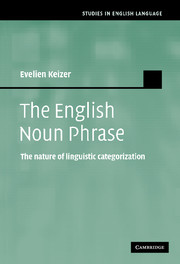Book contents
- Frontmatter
- Contents
- Acknowledgements
- 1 Introduction
- PART I The structural approach: possibilities and limitations
- PART II The cognitive-pragmatic approach: some applications
- 9 The flexibility of language
- 10 Complements and modifiers
- 11 Discontinuous NPs
- 12 Possessive constructions: the author's opinion versus the opinion of the author
- 13 Conclusions
- Bibliography
- Author index
- Subject index
9 - The flexibility of language
Published online by Cambridge University Press: 25 January 2010
- Frontmatter
- Contents
- Acknowledgements
- 1 Introduction
- PART I The structural approach: possibilities and limitations
- PART II The cognitive-pragmatic approach: some applications
- 9 The flexibility of language
- 10 Complements and modifiers
- 11 Discontinuous NPs
- 12 Possessive constructions: the author's opinion versus the opinion of the author
- 13 Conclusions
- Bibliography
- Author index
- Subject index
Summary
Introduction
Any linguist even remotely familiar with such pragmatic notions as given/new and topic/focus is undoubtedly aware of the terminological confusion prevailing in this area, which has been the cause of many a breakdown of communication between linguists dealing with these notions (e.g. Levinson 1983: x; Chafe 1987: 21; Lambrecht 1994: 1). This lack of terminological consensus has generated a growing scepticism about the applicability and usefulness not only of the notions involved, but of information structure research in general; a scepticism which is strengthened by the fact that, since functional linguists are dealing simultaneously with formal and communicative aspects of the language, their approach does not offer ‘the comfort which many syntacticians find in the idea of studying an autonomous formal object’ (Lambrecht 1994: 1).
However, conceptual vagueness and lack of autonomy are not by definition bad qualities. Functional and cognitive linguists simply acknowledge that much of the formal behaviour of linguistic utterances can only be explained through a combination of syntactic, semantic, pragmatic and cognitive factors. For these linguists the idea that many linguistic concepts tend to be fuzzy rather than strictly definable is a welcoming idea rather than a problematic one (e.g. Hopper and Thompson 1980; Jackendoff 1983, 1990, 1992; Lakoff 1987; Langacker 1987; Taylor 2003). As for the terminological confusion, to conclude that because one and the same term has been used to refer to different pragmatic notions, these notions themselves are no longer useful, is of course an obvious case of throwing the baby out with the bathwater.
- Type
- Chapter
- Information
- The English Noun PhraseThe Nature of Linguistic Categorization, pp. 189 - 217Publisher: Cambridge University PressPrint publication year: 2007

